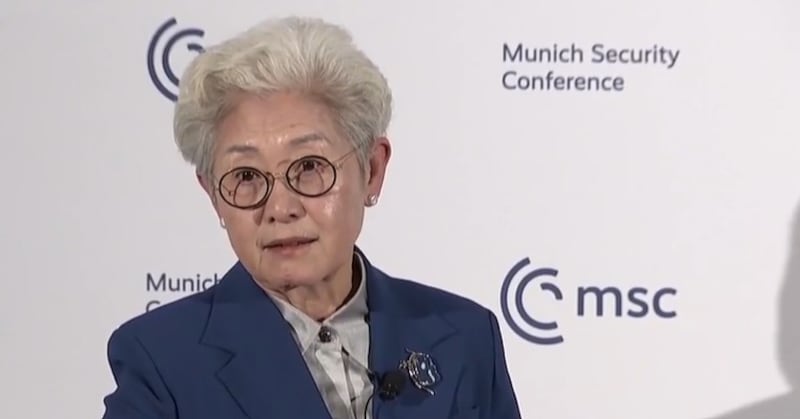Maritime tensions between China and the Philippines were in the spotlight at the Munich Security Conference, with former Chinese vice foreign minister Fu Ying calling the occupation of disputed features in the South China Sea “a red line.”
Speaking at a forum at the annual international security conference at the weekend, Fu said that China had a very strong position on ownership over territories and “we cannot lose them.”
The former vice minister said China would not agree to the Philippines occupying the Second Thomas Shoal and Sabina Shoal, where Chinese and Philippine ships have been confronting each other over the past two years.
Both are within the Philippines’ exclusive economic zone.

Fu, who served as Chinese ambassador to the Philippines from 1998 to 2000, spoke of how Manila deliberately ran aground an old naval ship on the Second Thomas Shoal in 1999 to use as an outpost. It attempted to do the same at Scarborough Shoal, which is classified as a rock under the United Nations Convention on the Law of the Sea, or UNCLOS.
“If the Philippines can take new rocks how can you stop others?” Fu asked. “How can you stop China from taking more?”
“We’re capable, there’s no problem, but we are exercising constraint,” the former diplomat said, adding that China was committed to the Declaration on the Conduct of Parties in the South China Sea that urges claimants to handle their differences in a constructive manner.
“That’s a red line no one should be allowed to cross … that kind of naughtiness shouldn’t be encouraged,” she said.
China’s domestic law at sea
Philippines foreign secretary Enrique Manalo, meanwhile, said his country was “following international law.”
“But when another country … applies its own domestic laws to certain areas within our exclusive economic zone then it really does create the kind of tension that we have been experiencing especially over the last two years,” Manalo said.
All the disputed features mentioned by Fu are miles away from the Chinese coast, Manolo pointed out.
The foreign secretary added that Manila had received support from like-minded nations.
“I haven’t heard of any country really coming out against what we’ve been doing except for one,” he said, referring to China.
RELATED STORIES
Philippines says it won’t let China normalize ‘illegal’ ship deployments in EEZ
With acoustic blast, China ups aggression in disputed waters: Philippine Navy
Philippines suspends South China Sea science mission after China ‘harassment’
Foreign ministers from the Group of Seven developed countries, or G7, who also met at the Munich Security Conference, “reiterated their commitment to a free, open and secure Indo-Pacific region, grounded in respect for the rule of law and sovereignty,” they said in a joint statement.
“They strongly opposed China’s attempts to restrict freedom of navigation through militarization and coercive activities in the South China Sea.”
U.S. Secretary of State Marco Rubio met separately with his Philippine counterpart, Enrique Manolo, and “not only reaffirmed U.S. commitment to the United States-Philippines Alliance, but noted his enthusiasm for building an even more invested and enduring relationship,” the U.S. State Department said.
US-China strategic competition
For her part, Fu said, “what concerns China now is the shadow of the U.S. behind the claimants.”
Singapore’s defense minister, Ng Eng Hen, said that China’s stance on the South China Sea was that countries outside the region should not get involved.
But the question “when China is strong enough what would it do?” is what strikes fear in countries in the region, Ng said,
“It’s up to China to assure its neighbors,” he said.
The Singaporean minister noted that China wanted to show deterrence by strength as the U.S. does and the strategic competition between the U.S. and China “is still in play” in the South China Sea.
Speaking of the U.S.-China rivalry, Chinese top diplomat Wang Yi, after delivering a keynote speech at the Munich gathering, said that the two countries “must not come into conflict, otherwise, the world will suffer.”
“China is full of confidence in the future of China-U.S. relations, but if the United States insists on suppressing China, China will have no choice but to fight to the end,” Wang said.
Edited by Mike Firn.
